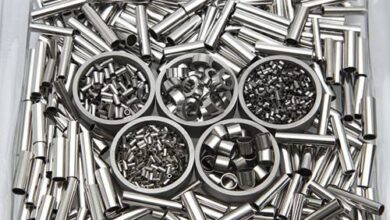The Latest Trends in Industrial Hardware for Automation Solutions
In today’s rapidly evolving technological landscape, industrial automation has become an essential component of modern manufacturing processes.
Companies are constantly seeking ways to streamline their operations, increase efficiency, and reduce costs through the implementation of automation solutions.
One of the key drivers of this automation revolution is the continuous advancement in industrial hardware technologies. In this article, we will explore the latest trends in industrial hardware for automation solutions.
1. Internet of Things (IoT)
The Internet of Things (IoT) has revolutionized the way industrial hardware interacts and communicates with each other.
Industrial automation solutions are increasingly integrating the Internet of Things (IoT) to create interconnected systems that revolutionize manufacturing processes.
By leveraging IoT technology, industrial automation solutions enable real-time monitoring, predictive maintenance, and data-driven decision-making, optimizing efficiency and productivity on the factory floor.
By utilizing IoT technology, manufacturers can monitor equipment performance, predict maintenance needs, and improve overall efficiency. The data collected from IoT devices can also be analyzed to identify patterns, trends, and potential areas for improvement.
Additionally, IoT enables remote monitoring and control, reducing the need for manual intervention and increasing operational flexibility. Overall, the integration of IoT in industrial settings has led to increased automation, enhanced productivity, and improved decision-making capabilities.
As technology continues to advance, the possibilities for innovation in the manufacturing industry are endless, making the concept of smart factories an exciting reality for the future.
2. Artificial Intelligence (AI) and Machine Learning
Artificial Intelligence (AI) and Machine Learning are reshaping the industrial hardware landscape by enabling machines to learn from data, identify patterns, and make decisions with minimal human intervention.
AI-powered industrial hardware can now predict equipment failures before they occur, optimize production schedules, and even adapt to changing production conditions in real-time.
As AI continues to advance, industrial automation systems are becoming more autonomous and intelligent.
This shift towards AI and machine learning in industrial hardware is revolutionizing the way companies operate, increasing efficiency, reducing downtime, and improving overall productivity.
With the ability to analyze vast amounts of data quickly and accurately, AI-powered machines are transforming traditional manufacturing processes into smart, connected systems that can respond to changes in real-time.
This has the potential to not only streamline operations but also drive innovation and drive new levels of competitiveness in the industrial sector.
As companies continue to embrace these technologies, the future of industrial hardware is looking increasingly intelligent and autonomous.
3. Robotics and Cobots
Robots have long been a staple in industrial automation, but recent advancements in robotics technology have led to the rise of collaborative robots, or cobots. Cobots are designed to work alongside human operators, enhancing productivity and efficiency on the factory floor.
These robots are equipped with advanced sensors and vision systems that allow them to safely interact with humans and perform a variety of tasks, from assembly to packaging.
Cobots are programmed to stop immediately if they detect any unexpected obstacles or contact with a human, ensuring a safe working environment. They are also relatively easy to set up and program, making them accessible even to small and medium-sized businesses.
With their flexibility and ability to adapt to different tasks, cobots are revolutionizing the manufacturing industry by increasing production speed, improving product quality, and reducing the risk of workplace injuries. As technology continues to advance, we can expect to see even more innovative applications for cobots in various industries.
4. Additive Manufacturing
Additive manufacturing, or 3D printing, is revolutionizing the way industrial components are produced.
This technology allows for the rapid prototyping and customization of parts, reducing lead times and costs associated with traditional manufacturing methods.
Industrial hardware such as 3D printers are now being integrated into production lines to create complex components on-demand, enabling greater flexibility and agility in manufacturing processes.
Additive manufacturing, or 3D printing, is revolutionizing the way industrial components are produced. This technology allows for the rapid prototyping and customization of parts, reducing lead times and costs associated with traditional manufacturing methods.
Industrial hardware such as 3D printers are now being integrated into production lines to create complex components on-demand, enabling greater flexibility and agility in manufacturing processes.
As a result, industries are experiencing increased efficiency, reduced waste, and the ability to quickly adapt to changing market demands. The potential for innovation and growth in the manufacturing sector is vast with the adoption of additive manufacturing technologies.
5. Edge Computing
Edge computing is emerging as a critical technology in industrial automation, especially in environments where real-time data processing is essential.
By bringing computing power closer to the data source, edge computing reduces latency and enables faster decision-making in industrial applications. Industrial hardware equipped with edge computing capabilities can analyze data on-site, making it ideal for applications that require quick response times and high reliability.
Edge computing is revolutionizing the industrial automation sector by enhancing real-time data processing capabilities. It is a technology that brings computing power closer to the data source, thereby reducing latency and enabling faster decision-making in industrial applications.
Industrial hardware integrated with edge computing capabilities can analyze data on-site, making it perfect for applications that demand quick response times and high reliability. This innovation is proving to be crucial in optimizing operations and driving efficiency in industrial settings.
Conclusion
As industrial automation continues to evolve, the latest trends in industrial hardware are shaping the future of manufacturing. From IoT and AI to robotics and edge computing, these technologies are revolutionizing how companies operate and produce goods. By embracing these trends and investing in advanced industrial hardware solutions, businesses can stay ahead of the competition, increase efficiency, and drive innovation in the ever-changing industrial landscape.



